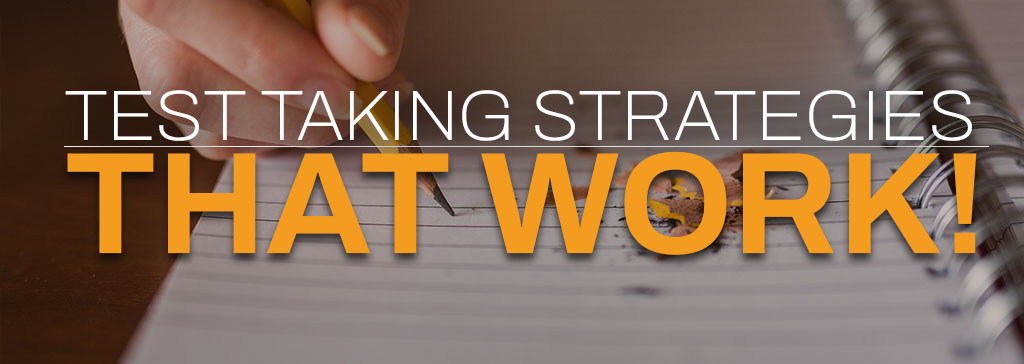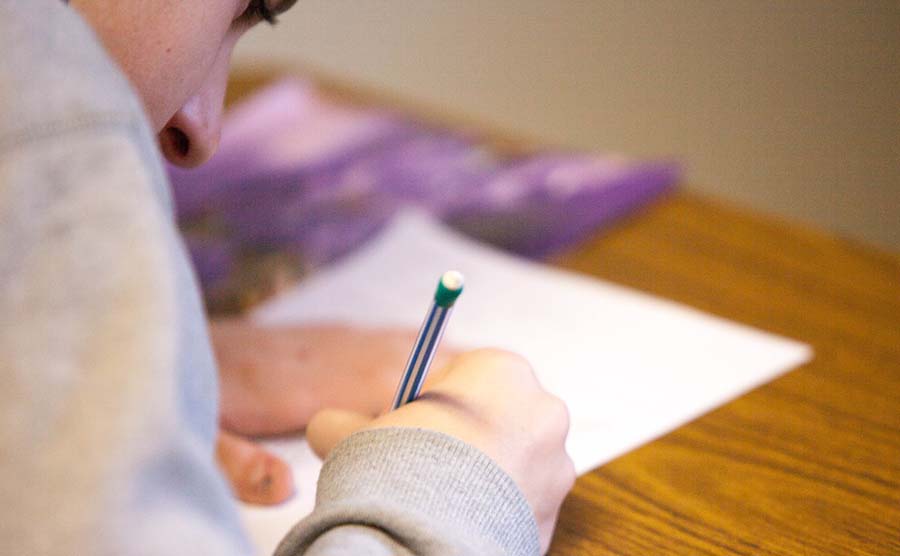
By Karen Edwards, Ph.D.
Are you getting ready to take a test or certification exam? Do you get nervous at just the thought of it? Fear no more! This blog post will show you test taking strategies that work to ease your test anxiety and help you pass your next exam in a few simple steps.
Step 1: Practice, Practice, Practice
Participate: Be sure that you are attending live classes whenever possible. Over the years, Laurus College instructors have observed that students who regularly attend live class sessions frequently outperform peers who watch recordings. The reason is simple: students who are actively engaged in class can get immediate feedback, as well as the traditional benefits of in-person instruction. In fact, Stanford University’s Center for Professional Development advocates for online students to “actively engage with the course materials. Just as with face-to-face learning, mental energy counts: take time to reflect on whether you have understood the materials… participate in class discussions, ask questions…” After class, try summarizing what you’ve learned. Make printed or digital notecards and study aids. If you have questions, be sure to reach out to your instructor and take advantage of lab days!
Overlearn: I’m sure you’ve heard the expression, “practice makes perfect.” However, did you know this saying is actually based in science? When you keep practicing or studying material, it can lead to something called “overlearning.” Overlearning is a term that refers to practicing even after you feel you have already mastered the material. (There’s no such thing as truly overlearning, so this method works!) Researchers at Brown University found that “‘overlearning’ locked in performance gains on tests. Don’t settle for just knowing the material. If you have the time, keep reviewing that material right up until the test. Also, if practice tests are available, be sure to take them! Experts suggest replicating the conditions of the actual test to be best prepared. This means timing the exam and limiting access to only the materials that you will have available for the real test. Overall, practice makes perfect, so the more you can prepare through practice, the better you will perform!

Step 2: Prepare Mentally
Relax: While you’re practicing, prepare yourself mentally for the test. We often underestimate the impact of anxiety on test performance. Not surprisingly, high test anxiety negatively impacts performance. Try different ways to reduce test anxiety, including relaxation techniques and visualization. Relaxation techniques like deep breathing are useful. If you haven’t tried it, visualization can also be useful before tests. “Visualization is more than just (day) dreaming. By envisioning yourself in a circumstance or situation, you actually are doing a great deal of mental ‘work’ to clarify and plan for your goals.” Click here to give visualization a try!
Stay Positive: No matter what happens, maintain a positive attitude. Have you ever told someone, “You’ve got this!”? It’s all about the power of positive thinking. Many successful leaders and influencers credit their success to maintaining a positive outlook. A few years ago, Stanford University researchers tested the impact of positive thinking on academic performance. Although the test group focused on school-aged children, one thing was clear: attitudes affect performance. So why not give it a try? If you’re a student or faculty member in need of some positive support, try visiting the Kindness Corner on My Laurus Portal for some inspiration!

Step 3: Prepare Physically
Get Sleep: One of the most things you can do to physically prepare for a big test or exam is absolutely nothing… by getting a good night’s sleep! Various studies have shown the impact of sleep on brain function. A few years ago, a National Sleep Foundation poll found that “only 10 percent of adults prioritize sleep over other aspects of daily living, such as work and hobbies.” If you are pushing sleep to the sidelines, it can impact you academically. So how much sleep should you get? It’s always good to check with your doctor, but experts recommend most adults get a minimum of seven hours of sleep per night. It may take several nights of good sleep to bounce back if you’ve been sleep deprived. With this said, don’t underestimate the usefulness of a nap. In 2016, a research study at Duke – NUS Medical in Singapore, found that napping is as powerful as last minute cramming. One of the leaders of the study, James Cousins, said “don’t stress yourself out just cramming some information into your head. Taking a nap is just as good.” A nap has never sounded better!
Stay Hydrated & Eat Healthy: One final bit of advice is don’t underestimate the power of staying hydrated and eating healthy before an exam. Studies show that dehydration can negatively impact cognitive function. Staying hydrated helps your mind focus on doing your best on the test! Similarly, it helps to eat a healthy, light meal, before taking a big test or exam. Research suggests the “best” things to eat for brain function are: complex carbohydrates (also called slow-burning or slow release carbs), like whole grain oatmeal or wheat bread, as well as healthy protein, vegetables, fruit, and foods with Omega-3 fats. Starting the night before a test, be sure to stay away from alcohol, caffeine, and sugary foods. All of these may have a negative impact on your performance. Below are some links to useful test taking strategies, as well as suggestions for brain-friendly pre-exam foods.

Useful Links for Test Taking Strategies
- https://www.usf.edu/undergrad/academic-success-center/documents/10-test-taking-strategies.pdf
- https://learningcenter.unc.edu/tips-and-tools/studying-101-study-smarter-not-harder/
- https://www.surrey.ac.uk/features/eating-exam-success
- https://www.pluralsight.com/blog/career/4-tips-for-acing-the-comptia-a–certification-exams
[author_bio]
References
- Tips for Learning Online, Stanford University, https://scpd.stanford.edu/tips-learning-online
- Practice makes perfect, and ‘overlearning’ locks it in,” Brown University, https://www.brown.edu/news/2017-01-30/overlearn
- What To Do with Practice Exams, Cornell University, https://lsc.cornell.edu/how-to-study/studying-for-and-taking-exams/what-to-do-with-practice-exams/
- The effect of study preparation on test anxiety and performance: a quasi-experimental study, Hasan Yusefzadeh, Jamileh Amirzadeh Iranagh, Bahram Nabilou, https://www.dovepress.com/the-effect-of-study-preparation-on-test-anxiety-and-performance-a-quas-peer-reviewed-fulltext-article-AMEP
- Managing Your Success: What is Visualization?, Daytona State University, https://library.daytonastate.edu/success/visualize
- “New study from Stanford University finds that positivity makes kids more successful,” Abigail Hess, https://neuroscience.stanford.edu/news/new-study-stanford-university-finds-positivity-makes-kids-more-successful
- A bad night’s sleep messes with your brain’s memory connections,” Andy Coghlan, https://www.newscientist.com/article/2102044-a-bad-nights-sleep-messes-with-your-brains-memory-connections/
- “How Sleeping Better Can Give Your Brain a Big Boost (+ Tips for Making That Happen!), Cleveland Clinic, https://health.clevelandclinic.org/how-sleeping-better-can-give-your-brain-a-big-boost-and-tips-for-making-that-happen/
- Napping before an exam is as good for your memory as cramming,” Jessica Hamzelou, New Scientist, https://www.newscientist.com/article/2112972-napping-before-an-exam-is-as-good-for-your-memory-as-cramming/#ixzz75otwgyjX
- The Influence of Dehydration on Cognition, William M. Adams, MS, ATC and Douglas J. Casa, PhD, ATC, University of Connecticut, https://ksi.uconn.edu/wp-content/uploads/sites/1222/2015/04/Influence-of-Hydration-on-Cognition.pdf
- “Can food improve your exam performance?,” Dr Alex Richardson, https://www.bbc.co.uk/food/articles/food_exam_performance
- “Preparing for exams,” University of Leicester, UK, https://www2.le.ac.uk/offices/healthy-living-for-students/preparation-for-exams
